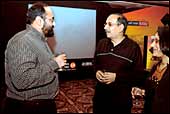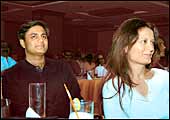 |
| The heat is on: (L-R) Infosys' Nilekani
and Gurcharan Das debate at the Business Today Crossfire |
The
Taj Presidency may not be the proper place to discuss what's civilised
or not about Bangalore, located as the hotel is in that very city.
But Suhel Seth, CEO Equus Red Cell and BT Crossfire moderator for
the evening, took the liberty anyway. The three civilised aspects
he spied were: "Its people, of course, the weather, and the
fact that people come here on time."
Sponsored by Royal Challenge and held in association
with Liberty, the debate's topic was 'You cannot create a great
brand without advertising'. In support of the motion stood Gurcharan
Das, playwright, former head of P&G India and author of Indian
Unbound. And against it stood Nandan Nilekani, CEO, Infosys Technologies.
Das opened by making a case that even the PowerPoint
presentations Nilekani goes about making for Infosys, are in fact
a form of advertising. "Nandan understands that the human mind
is not a computer. The human mind retains just around 5 per cent
of what it sees and hears. To be in this 5 per cent, you need advertising.
One, to occupy a distinct space, but two, to remind your customer
about your brand," said Das, proceeding to cite the famous
adworld quotation comparing building a brand without advertising
to winking at a girl in the dark ("Only you know what you're
doing").
Every business needs a competitive advantage,
and needs to convey it to customers-for which advertising is a supremely
effective method. If you hit upon a Big Idea, then this is all the
more so, he added, citing the instance of Pidilite's 'fishing' commercial
(which would make its point even on 'mute', his favourite test).
That's not to imply, he cautioned, that a great brand can be created
for a lousy product through brilliant advertising. "Advertising
will give you awareness and trial, but you need performance for
repeat purchase. It helps to also translate your brand equity into
action."
That action, though, requires that the campaign
be well-aimed at the chosen audience. "And I think this is
where India Shining went wrong," said Das, "It was a great
campaign, but was wrongly targeted." While investors responded
to it, as per the original plan, common voters did not-since it
was inapt as an election campaign.
To round up, Das narrated a little joke about
a family that saw its family affairs as a sort of business, with
dad being 'capital', mom 'management', baby 'the future', the maid
'labour'... and the little boy waking up late one night to find
that, "This is one hell-of-a business. Management is asleep.
Capital is exploiting labour, and the future stinks!"
Nilekani, at the other podium, opened with
a touche. Pronouncing himself glad that Das had talked about P&G,
Nilekani observed that "P&G itself is veering away from
advertising". By way of example, he spoke of P&G's Operation
Tremor, which employs hundreds of thousands of American teenagers
to popularise a new launch. "It is using viral marketing and
buzz to create a brand." This kind of thing cuts through the
ad-clutter, he emphasised. People, he said, were turning numb under
ad bombardment-barely even able to recall which ad is for which
brand.
The big four brands from India that had achieved
global recognition, meanwhile, were Infosys, IIT, Bangalore and
India as an outsourcing hub, announced a proud Nilekani (interrupting
him, Das added that many Americans have now heard of Bangalore but
not the Taj Mahal). India has stormed the international media as
an outsourcing hotspot. "Bill Gates is saying that India is
well on its way to becoming a global economic power," he said,
showing an American cartoon captioned, 'No, you may not outsource
your homework to India'. "This is a brand which has penetrated
everybody's mind. And this brand was created without spending, I'm
sorry to tell you guys, without spending a penny on advertising."
The IIT brand, meanwhile, was built by its
illustrious alumni in techland-and a Gates endorsement. And Dilbert
jibes. And Bangalore? "Let's do a Bangalore!" even John
Kerry had said. B-to-B is now 'Back to Bangalore', according to
the Financial Times. "And most important," Nilekani added,
"Bangalore is a verb. How many cities in the world become verbs?
The last one was Shanghai. To be 'Shanghaied' is to be kidnapped.
But there are T-shirts saying, 'Don't get Bangalored'."
Yes, and finally, Infosys-with a campus that
has become a destination for dignitaries on India visits. "Our
branding comes from our infrastructure," said the company's
CEO, portraying the AGMs, the annual reports, the global media coverage,
the fact of being a billion-dollar firm-all as key branding elements.
"And not a cent on advertising."
 |
On a lighter note: (L-R)
India Today's Editor Prabhu Chawla with Infosys CEO
Nandan Nilekani |
 |
| Chilling out: (L-R) BPL's Rajeev Chandrasekhar
with Feedback's V. Ravichandar and Infosys' Hema Ravichandar |
 |
| Playing the audience: (L-R) NGO Janaagraha's
Ramesh Ramanathan and wife Swati Ramanathan |
Seth struck out with Barista as his own example
of a brand built sans advertising. And with the two opposing arguments
having been made, it was time for the real fighting to begin. Das,
though, decided to re-enter the fray with, "Somebody said that
because of the outsourcing controversy that Kerry created in the
United States, India got $89 million worth of free advertising."
To which, Nilekani promptly responded, "Alright, gentlemen.
We're ready for drinks. He has conceded."
It was, perhaps, a case of premature articulation.
For, itching though people were to hit the bar, plenty of hair-tearing
was to come for the evening-particularly on the issue of what qualifies
as advertising and what does not. A question of definitions.
"They calculated $89 million worth of
free advertising," repeated Das. The publicity was measured,
still, in advertising terms. But could a brand like Pantene, wondered
Das, get that sort of publicity? Besides, all image-oriented communication
aimed at audiences-even the charisma of leaders-is broadly 'advertising'
(just as Bangalore is broadly taken to be a 'brand'). So to that
extent, one can't do without it. "In the 17 minutes you spoke,"
said Das, "about nine minutes you spoke about your own company...
what was that, advertising or communication?" In response,
Nilekani flatly denied spending nine minutes on Infosys, and refused
to call it 'advertising'.
Then came the Q&A session, and a voluble
member of the audience insisted that any communication motivated
by an objective should be called advertising. Another got up to
back this logic with the argument that people yelling on horseback
or from turrets in the old days was the advertising of its time,
and now the media vehicles have changed with the advent of new technologies.
So why have a hard-and-fast definition?
Yet another audience member asked Nilekani
how Infosys could differentiate itself without ads. To this, the
CEO spoke of "inspiring trust" and the "service experience",
and added that Google was another great brand built purely on usage
buzz.
But what about word-of-mouth, asked someone
in the hall, going back to the argument over definitions-was that
also 'advertising'? No, said Das. Nilekani agreed, shaking his head.
Then came some more questions that had entire
debates woven into them, which gave Seth just the moment he needed
to wind up the debate-with a fourth point to make on how civilised
the city is. "Bangalore has this unique way of asking questions,"
he quipped, "We must pick it up. You have the question, then
the answer, and then you're just looking for a 'yes' or 'no' from
the speakers. You make the work so easy." Except that no winner
was to be declared. As Seth put it, "The topics are always
structured so that they never have complete resolution, much like
most of our country, a country of paradoxes."
|
